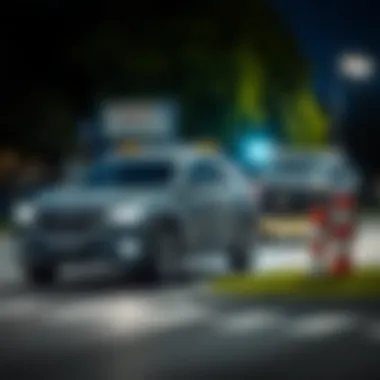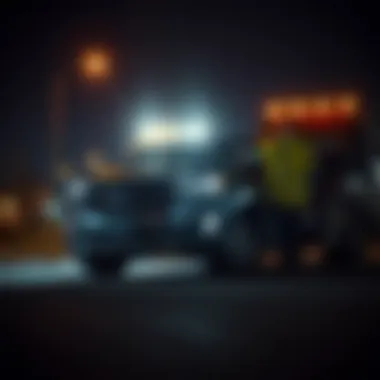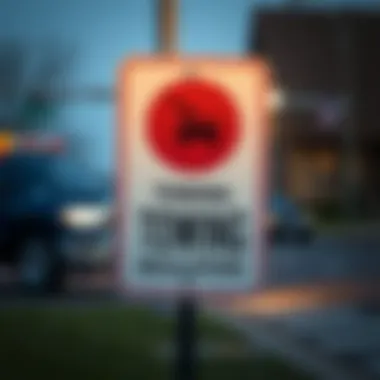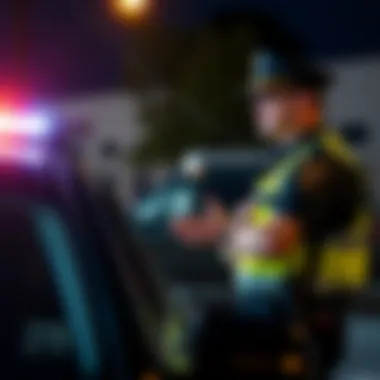How to Determine If Your Vehicle Has Been Towed


Intro
Losing sight of your vehicle in a busy parking lot or an unfamiliar area can be panic-inducing. The real kicker? Realizing it’s not just misplaced but towed. Understanding how to determine if your vehicle has been towed is crucial. After all, confronting this situation can be daunting, especially with emotions running high. Often, the first thought is, "What on Earth happened to my car?" To clarify this unsettling experience, we will walk through various steps to verify a towing incident, what to do afterward, and how to avoid it in the future.
When your automobile seems to have vanished without a trace, your first instinct may take a wild leap to the conclusion that it’s been stolen. However, it might just be that it’s been towed. Before you jump to conclusions implying the worst, let’s explore how to confirm its fate and streamline your next course of action.
This article pulls together a comprehensive toolset designed for every vehicle owner, providing insights on communication with authorities, engaging with towing companies, and preventive actions to steer clear of unauthorized towing incidents. So, buckle up, because we're about to delve into the nitty-gritty of determining if your beloved vehicle has been towed.
Prelims to Vehicle Towing
Understanding the ins and outs of vehicle towing is no small feat. It’s a common occurrence that can leave people scratching their heads and worried about their property. Knowing how towing works, when it typically happens, and what steps to take if your vehicle goes missing is crucial for any driver. This section sets the stage for understanding these dynamics, ensuring that vehicle owners are prepared and informed.
When it comes to towing, awareness is key. Not only can towing happen without much notice, but the implications of being towed can also have both financial and logistical effects on the owner. Awareness of local towing laws and regulations can prevent unexpected fees and hassles later on.
Moreover, it’s vital to grasp the reasons vehicles might end up being towed. Towing can stem from inadequate parking choices, violations of parking restrictions, or even local law enforcement actions. By understanding these basics, vehicle owners can take preventative measures to avoid such scenarios.
Understanding the Basics of Towing
Towing, essentially, refers to the process of removing a vehicle from its parking spot, often without the owner's consent. It can occur for various reasons, like illegal parking, blocking driveways, or more. The mechanics of towing involve specific equipment, like tow trucks and winches, to safely hook and transport vehicles.
It's worth noting the distinction between private and public towing. Public towing typically involves law enforcement and city regulations. These tows are usually well-documented and conducted under formal guidelines. In contrast, private towing may arise from property owners attempting to enforce parking rules on their premises. Understanding these kinds can help vehicle owners know what to expect when they can't find their vehicle.
Common Reasons Vehicles Are Towed
Countless factors may lead to a vehicle being towed, and knowing them can save you a boatload of trouble.
Here are some common reasons:
- Illegal Parking: This is the biggie. Parking where signs clearly prohibit it can get your car hooked in a hurry.
- Expired Registration: If your tags are out of date, authorities may take a keen interest in your vehicle.
- Blocked Access: Whether it’s a fire lane, driveway, or loading zone, blocking an access point results in fast-tracking for your car to the impound lot.
- Street Cleaning: Some neighborhoods enforce strict parking rules during designated street cleaning days. Missing those signs might lead to a surprise.
- Safety Hazards: If a vehicle is deemed unsafe or abandoned, it might be removed for safety reasons.
Understanding these factors helps vehicle owners remain vigilant and informed, allowing them to navigate parking regulations with greater ease. Keep in mind, the more you know, the better your chances are to avoid the dreaded tow truck.
Signs That Your Vehicle Has Been Towed
Recognizing the signs that your vehicle has been towed is crucial for clearing the air about its whereabouts. Whether it’s your daily commuter or your pride and joy, understanding these indicators can save you time, frustration, and potentially unwanted fees. By being proactive and aware, you can navigate the situation better and take the right steps once you realize your vehicle is not where you left it.
Absence of Vehicle
The most immediate sign that your vehicle may have been towed is simply its absence. When you return to the spot where you parked, the first thing you expect to see is your car. If it’s not there, it is natural to feel a pang of unease. Before jumping to any conclusions, take a moment to assess the situation:
- Look Around: Sometimes, other vehicles might be blocking your view. It’s wise to check if your car is just out of eyesight.
- Check Nearby Areas: Occasionally, vehicles are moved a short distance away. Reconfirm the area surrounding where you last parked.
If you still don’t see your vehicle, then the next step is to consider the likelihood of towing.
Unusual Surroundings
The environment surrounding the parking space can offer clues. Pay attention to any changes in the area. If you notice the following, you might have cause for concern:


- Towing Signs: Look for any signs indicating that parking in that area requires a permit or is restricted during certain hours. Even if you’ve parked there previously without issues, regulations may change.
- Surveillance Cameras: Some areas have cameras monitoring for parking violations. Seeing camera installations can be a reminder to double-check the rules in that location.
If the usual sights seem to differ or if you stumble upon 'No Parking' signs that weren’t there before, it's a good idea to explore further.
Notices on the Windshield
If your vehicle was towed, you might find a notice on your windshield instead of your car being in sight. These notices serve as formal communication from towing companies or local authorities and can be pivotal to understanding your next steps. Keep an eye out for:
- Tow Notices: These typically specify why the tow was enacted, the time it occurred, and where your vehicle is being held.
- Fines or Fees: Often, the notice outlines any fines associated with the towing, which can help you get ahead of any unexpected costs.
"Notices can offer you the insight needed to address the situation promptly and avoid additional inconveniences."
While it can be disheartening to find a note left behind, understanding its contents enables you to move forward in retrieving your vehicle more efficiently.
In essence, spotting these signs early can make the towing situation less of a headache, allowing you to act swiftly and reduce potential costs or complications. It's best to stay informed and be cautious, as this can save you from a world of trouble.
Immediate Steps to Verify Towing
When that sinking feeling hits you because your vehicle is no longer where you left it, taking swift action is crucial. Understanding what steps to take next not only minimizes anxiety but also clarifies the situation. Knowing how to efficiently verify if your vehicle has been towed can save you time and possibly money. The following segments elucidate the actions you can take to get to the bottom of the matter, emphasizing the significance of each step.
Contacting Local Towing Companies
One of the first actions you should consider is reaching out to local towing companies. This method can often yield valuable and prompt information about your vehicle’s whereabouts. When you make that call, be ready to provide relevant details like the make and model of your vehicle, along with your license plate number. If you remember the exact time and location where you parked, that can expedite the process as well.
Don’t just call any towing service; make sure to reach out to the ones operating in the area where your vehicle was parked. Many times, cities have preferred companies that are called by local law enforcement for towing incidents.
"In the chaos of searching for your vehicle, remember that a direct call to local towing companies can often clear up confusion quicker than you think."
Consulting Local Authorities
If you can't find anything helpful from the towing companies, the next sensible step is consulting local authorities. Whether it’s your city’s police department or local parking enforcement, these entities can provide crucial insights into whether your vehicle has been impounded. It’s wise to understand if any parking restrictions were in place or if your vehicle has been involved in any incidents leading to towing.
When speaking with law enforcement, you might need to provide identification and details about your vehicle. Keep in mind that some jurisdictions may have specific protocols about reporting and searching for towed vehicles. Sometimes, a small note pinned up at the precinct can lead to quicker resolutions.
Utilizing Online Resources
On the internet side of things, several resources can be of assistance. Many cities have online databases where residents can check the status of vehicles. These platforms can allow you to quickly ascertain whether your vehicle is in the hands of a towing service. Just type your city name followed by "towed vehicles" into a search engine to pull up relevant results.
Social media is not to be overlooked either; community groups on platforms like Facebook can often have local residents keeping tabs on other towing incidents, providing timely updates and personal experiences. Sometimes asking for help from locals who might have seen your vehicle parked there can also offer leads.
Lastly, don't forget vehicle location apps that you might have downloaded. These can aid in tracking the whereabouts of your car if GPS was active when you parked.
By taking these immediate steps—calling towing companies, engaging with local authorities, and utilizing online resources—you can clarify whether your vehicle has been towed. Remember, a proactive approach can lead you to your vehicle sooner rather than later.
Engaging with Towing Services
When the realization hits that your vehicle may have been towed, it's essential to approach the situation with a clear strategy. Engaging with towing services involves knowing what information is beneficial, communicating effectively, and understanding the costs associated with recovering your vehicle. This section serves as a guide to navigating the interaction with towing companies.


Important Information to Have Ready
Prior to contacting towing services, it's crucial to gather specific information that will aid in the swift recovery of your vehicle. Having the right details at hand can significantly streamline the process.
Make and Model of Your Vehicle
Knowing the make and model of your vehicle is more than just trivia; it bears significant implications when communicating with towing services. Each vehicle has distinguishing features, which can simplify identification. For instance, if your car is a Honda Accord, its unique specs—like the vehicle type, color, and any distinct aftermarket modifications—will help the towing company pinpoint it quickly.
- Key Characteristics: Different vehicles tend to have different towing regulations and fees. For example, a compact car may incur lower fees compared to a larger SUV.
- Why It's Beneficial: Such information plays a pivotal role in ensuring that you receive accurate information from the towing company and avoid unnecessary back-and-forth.
- Unique Features: The overall reputation of certain brands, like Subaru for its all-wheel drive reliability, might also impact its likelihood of being towed in specific situations, emphasizing the importance of knowing your vehicle's specifics in regards to regional towing practices.
License Plate Number
Your license plate number is a critical identifier used by towing services to resolve where and why your vehicle was towed. Having this number ready can expedite the retrieval process and helps verify your ownership of the vehicle.
- Key Characteristic: Each license plate number is unique and is tied directly to a specific vehicle owner. This ensures that if your car is reported as towed, it can only be linked back to you.
- Why It’s Beneficial: A quick mention of your license plate during a phone call minimizes confusion, allowing the towing service to provide precise information regarding the circumstances of your vehicle's towing.
- Unique Feature: Depending on your region, some states allow personalized plates which may carry additional significance or require specific regulations—making it crucial to have the exact number at your fingertips.
Time and Location of Parking
The time and location where your vehicle was parked is paramount when engaging with towing services. It provides context to the towing scenario and aids in tracing where your vehicle might currently be.
- Key Characteristic: Towing laws are often specific to certain times and areas—knowing when and where you parked can clarify if a towing might have been justified, such as during street cleaning or emergency vehicle access.
- Why It’s Beneficial: This information allows towing companies to quickly inform you of any relevant towing regulations that could have led to your vehicle's removal.
- Unique Feature: The location often entails the type of signs posted; a neighborhood might have specific community rules about parking which can change daily, requiring you to absolutely be aware of any temporary restrictions.
Understanding Towing Fees
In the world of towing, fees can vary greatly depending on multiple factors—location, time of day, and type of vehicle all play a role. Understanding potential fees in advance can save you from surprises when you locate your vehicle. Towing services may also add extra charges, so it’s vital to ask for a detailed breakdown before proceeding.
Remember, the faster you act, the better your chances are of recovering your vehicle with minimal hassle.
Legal Considerations Regarding Towing
Understanding the legal landscape surrounding towing is not just a matter of being informed; it's crucial for protecting your rights as a vehicle owner. The towing process can often feel like a labyrinth, full of technical jargon and local ordinances that can change from one neighborhood to another. Knowing the legal ramifications of towing can save you from unnecessary headaches, not to mention potential fines or fees you might incur if your vehicle is improperly towed.
Moreover, ensuring that you are compliant with local laws protects not just your vehicle, but also your rights. It allows you to stand firm in discussing the issue with tow truck operators or law enforcement, should the need arise. Towing regulations vary widely based on location, so it's vital to understand specific laws in your city or state.
Local Towing Laws and Regulations
Each city has its own set of towing laws designed to prevent abuse and ensure fairness among vehicle owners. Familiarizing yourself with these regulations can shed light on your options should your car go missing. For instance, in many areas, towing companies are required to post signs indicating that towing is enforced, including the fees associated with such measures. Without proper signage, a tow may be deemed illegal, granting you leverage to reclaim your vehicle without penalties.
Additionally, some localities mandate that a vehicle must be parked improperly for a specific duration before it can be towed. This could provide you some time to rectify the situation, thus avoiding further inconvenience. Here’s a breakdown of what to pay attention to:
- Notification Requirements: Are tow companies obligated to inform you before towing?
- Signage Rules: Are there visible signs about towing in the area?
- Maximum Fees: What are the legally enforced fees for towing?
- Recovery Timelines: How quickly must a vehicle be returned?
The knowledge of these rules can be a game-changer when you find yourself in a predicament involving a towed vehicle.
Differences in Residential vs Commercial Towing
The laws regulating towing can differ greatly between residential areas and commercial zones. In residential settings, stricter regulations tend to exist, mainly to protect residents from unlawful towing practices. This may involve longer wait periods before a tow can occur or stricter notification requirements. Residents often have a strong voice in their community's regulations, emphasizing fairness and minimizing undue frustration.


In contrast, commercial towing tends to be more lenient. Parking lots of businesses frequently employ aggressive towing policies. Businesses often keep a close eye on their parking spaces to ensure only customers use them, leading to quicker tow times for vehicles in violation.
Here are some key distinctions:
- Notification: Residential areas may require a warning before towing, while commercial lots could allow immediate towing without notice.
- Time Frame: The waiting period before a vehicle can be towed is often longer in residential settings.
- Fee Structures: Towing fees can be regulated differently depending on the type of zone, sometimes being higher in commercial areas due to demand.
Being aware of these differences can help you navigate the complexities of towing situations more effectively and prepare you for any disputes that may arise.
"Understanding your community's towing laws can be the difference between a frustrating experience and successfully reclaiming your vehicle."
In a nutshell, taking the time to familiarize yourself with the legal considerations relevant to towing can help avoid pitfalls. Whether you’re parked in a residential area or a busy commercial lot, knowledge is your best ally in these situations.
Preventive Measures Against Towing
Preventive measures against towing are crucial for vehicle owners who want to protect their property and minimize the hassle of retrieving a towed vehicle. The process of dealing with a towing incident can be distressing, and often involves additional costs and legal complexities. By understanding effective strategies, you can steer clear of these unwanted situations and ensure your vehicle remains safe and sound.
Understanding Parking Restrictions
Understanding parking restrictions in your area is fundamental to practicing responsible parking. Each neighborhood has its own set of rules. These can range from timed parking zones to specific areas prohibited from parking altogether. Signs indicating these restrictions may seem dull, but ignoring them can leave you in a pickle.
There’s no sweet way to say this: the last thing you want is for your car to be towed because you misunderstood a sign. Make it your mission to read all posted signage, even if it takes an extra minute. Many people think they know the rules, but countless tales exist of cars getting towed due to overlooking a small note about loading zones or street cleaning days. Familiarizing yourself with these restrictions can save you both time and money in the long run.
Strategies for Safe Parking
Choosing Safe Locations
Choosing safe parking locations is an essential strategy in keeping your vehicle from being towed. Always park in well-lit areas, preferably where other cars are visible. This not only discourages thieves but also ensures that you are not parked in a location at risk for towing. High foot traffic areas can be your friend; they often have less stringent parking enforcement.
A key characteristic of safe locations is proximity to your destination. Not only does it minimize the chance of falling prey to random towing, but it also enhances your overall experience. We have all heard horror stories about folks parking in the wrong spot just to find their vehicle missing miles away. Choosing a familiar spot near your endpoint greatly reduces the chance of this happening.
Using Recognizable Markers
Using recognizable markers is another vital strategy to prevent your car from being towed. What do we mean by that? Simply, when parking in unfamiliar places, use easily identifiable landmarks to remember where you left your car. Is it next to that infamous giant statue or near the cozy café with the blue awning?
This is instrumental because if you cannot find your vehicle, your first instinct may be to worry it's been towed. Recognizable markers boost your confidence that you will locate your car in a jiffy. However, there’s a caveat: markers might not prevent towing itself, but they help in reducing panic when you cannot immediately spot your vehicle.
Using identifiable landmarks can not only help find your car faster but reduce frustration in emergency situations.
Epilogue and Final Thoughts
Understanding whether your vehicle has been towed is crucial for any car owner. It can save not just time but also the heartache of losing your vehicle to an impound lot. Many folks overlook this aspect, but given the frequency of towing incidents in urban landscapes, everyone should have a grip on the details discussed in this article.
Summary of Key Points
Through this guide, we've covered the various signs indicating your vehicle might be missing, how to go about verifying its status, and the interaction with towing services. Each step serves as a crucial link in the chain of communication between you and the necessary authorities or towing companies. Grasping these elements can ensure you handle the situation efficiently without unnecessary stress.
- Signs of Towing: Recognizing the absence of your car, unusual surroundings, or signs left behind can all act as red flags.
- Immediate Actions: Knowing whom to contact—local towing businesses, police departments, and online resources helps clarify your car’s status quicker.
- Engaging With Towing Services: Prepare essential information ahead of time to streamline the process and understand possible fees involved.
- Legal Considerations: Being informed about local towing laws can protect you from unfair practices.
- Preventive Measures: Staying aware of parking restrictions and smart parking strategies can minimize the chances of your vehicle being towed in the first place.
Encouragement for Responsible Parking
The last word in this conversation is, of course, responsible parking. By being mindful of where you place your vehicle—paying attention to signs, understanding local regulations, and using familiar landmarks—you can drastically cut down the risk of waking up to an empty driveway.
In closing, it’s wise to think ahead, not just about your own convenience, but about how these parking habits can impact your daily life. If you're parking somewhere new or unknown, take that extra look around and think twice. Preventive action is always more favorable than dealing with the hassle of recovery and unexpected expenses.



